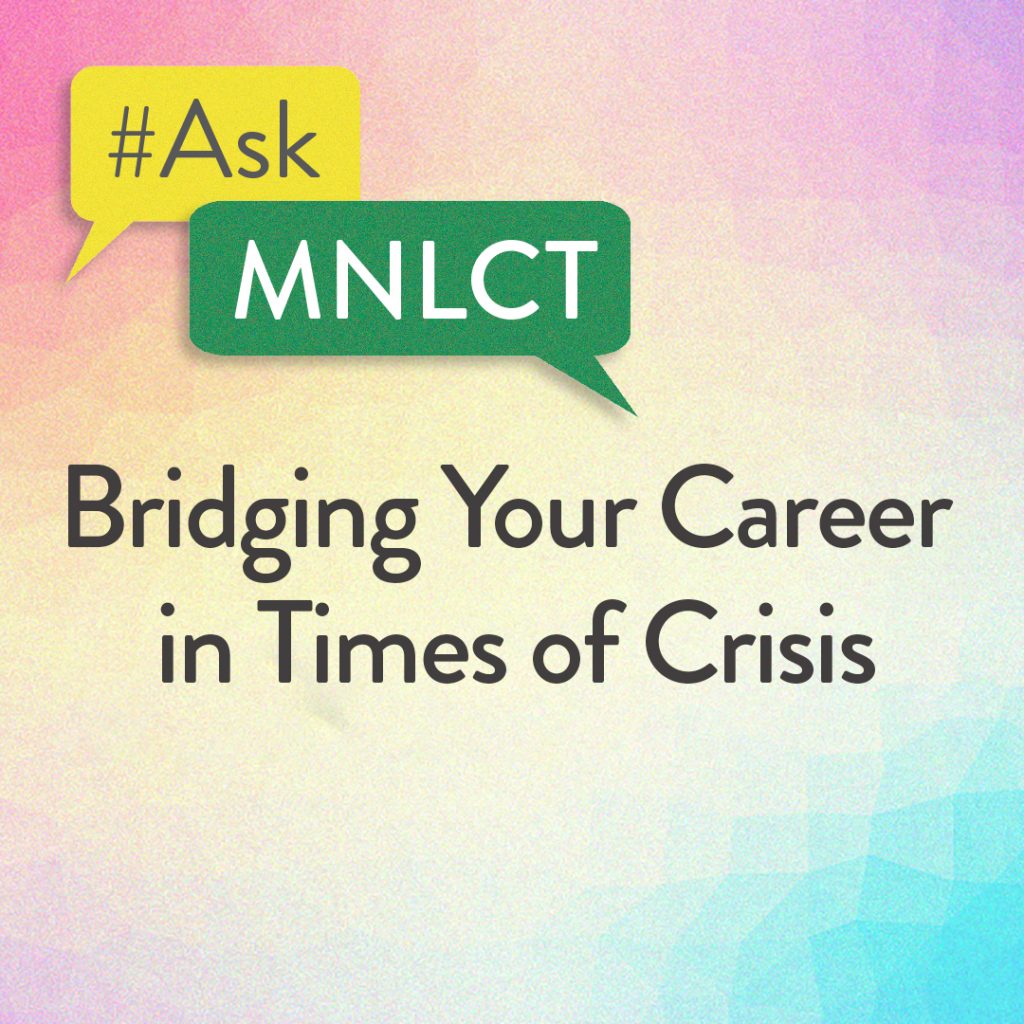Read further in this post to see our clients’ most frequently asked questions, then click on the link below to watch a recording of our webinar that occurred on Thursday, May 28, 2020. Members of our Bridge to Employment in Media & Communications (BEMC), Bridge to Registration and Employment in Mental Health (BREM), and Settlement Teams answered participants’ questions.
Do you have topic suggestions or questions you’d like answered in future editions? Send a note to our Communications Team: communications@mnlct.org.
MNLCT’s Bridging Programs
To understand the value of a bridging program, think of yourself as a brain library in which every shelf represents your personal and professional growth. When you immigrate you find out that your brain library suddenly has empty spaces on its shelves – a different language, culture, laws that govern your profession, ways to practice your profession – which require learning and adaptation to your new environment. A bridge training program values your knowledge and experience, and works to fill the gaps of work experience, professional currency, culture, communication abilities and language skills.
Bridging better prepares internationally educated professionals for their careers through the foundation and specialized skills that fill the gaps. Bridging offers an invaluable opportunity for you to convene and collaborate with colleagues, like-minded individuals and partners; thus creating opportunities for skilled immigrants to connect to the local labour market. BREM and BEMC work with key stakeholders, particularly employers, building their awareness and capacity to better integrate skilled immigrants into the workforce.
Academic programs are designed for local learners. Purely academic programs are designed to build a new shelf at the top of your library – they are not designed to fill the empty spaces of existing shelves. MNLCT’s bridge training programs recognize that students already have professional knowledge and what they need is not a program to teach them what they already know, but one to help them fill the gaps.
Placements are commensurate with the level of experience participants have. Unlike a post-secondary internship, each placement is designed to provide a fulfilling experience where participants can put their knowledge, training and experience in the field to use in a meaningful way with the support of a placement supervisor and team.
Placements provide you with an opportunity to launch your career in Canada by introducing you to networks, providing Canadian work experience, and integrating you into the Canadian labor market by providing an opportunity and environment to practice hard and soft skills.
Some of the main obstacles are lack of contacts and social networks, lack of Canadian experience, the to understand regulatory bodies and professional associations, lack of recognition of previous experience and education, language barriers and adjusting to Canadian workplace practices. MNLCT’s bridging programs have been specifically designed to navigate these obstacles and offer a specialized solution for you in your profession.
MNLCT constantly offers personalized services to all of our applicants and participants. We understand that during this time, getting documents and contacting people gets harder; therefore, we offer individual options in this regard. Furthermore, we have been able to offer accommodation to our current participants who are facing specific barriers such as lack of childcare and technological limitations. We re-evaluate the situation of our clients very often and we work hard to adapt to their needs. Needless to say, all of the classes are currently delivered fully online!
Due to COVID-19, all the bridging classes are currently delivered online via Zoom. Our programs are full time, delivered Monday to Friday between 9:00am and 2:00 pm with synchronized (real time) classes.
Bridge to Registration and Employment in Mental Health
BREM (Bridge to Registration and Employment in Mental Health) is built on the legacy of the Bridge Training Program for Internationally Trained Mental Health Professionals (BTMH). In 2010, the Mennonite New Life Centre of Toronto was given a grant by the Province of Ontario to create a pathway to employment for internationally trained mental health professionals in province. Since then, the program has welcomed and supported over 300 international professionals through a rich, diverse and relevant curriculum. We also help our participants and other mental health professionals with a strong background in psychotherapy to meet the requirements for registration with the College of Registered Psychotherapists. We have partnered with the mental health sector to support on-the-job work experiences for our program participants, and we continue to advocate with local employers to create opportunities.
The BREM Program is designed for immigrant professionals who have:
- Post-secondary education in psychology or a related field where a significant component is mental health (e.g., counselling, social work, medicine with specialization in psychiatry or psychotherapy, psychiatric nursing, occupational therapy focusing on mental health, divinity counselling, etc).
- The applicant’s post-secondary education must be evaluated as equivalent to a four-year Canadian Bachelor’s Degree, at the minimum.A minimum of two years of relevant work experience in psychotherapy, counselling or community mental health outside of Canada.
- Sufficient language skills (across all four language domains – reading, writing, listening, speaking) based on the following examinations (or equivalent):
- CLBPT – score of 7
- TOEFL score of 80
- IELTS score of 6.5
- CELBAN score of 7
- Immigration status: Refugee Claimant with work permit, Convention Refugee, Permanent Resident, Canadian Citizen.
Note: Applicants with a degree in medicine, nursing, occupational therapy, speech and language pathology, divinity, education and any other degree that isn’t directly related to psychology, must have a significant educational component related to mental health (minimum 100 hours).
- Attend an information session about BREM
- Fill out an application form on bridgingprograms.org
- Submit the following documents to adminbrem@mnlct.org to be reviewed by the admissions committee:
- Credentials assessment performed through one of the following recognized agencies:
- World Education Service (WES)*
- University of Toronto
- Medical Council of Canada: for internationally trained MDs, a letter must be submitted with the conclusion of assessment
- Canadian Association of Social Workers (CASW)
- International Credential Assessment Service (ICAS)
- Resume and cover letter addressing reasons for applying and career expectation
- Proof of previous employment in the field of mental health
- Employer’s official letterhead
- Reference’s name, position and contact information
- The period of employment
- A detailed description of responsibilities.
- Language Score – with a valid Language Assessment Test
- Evidence of eligibility to work in Ontario
Immigration documentation may include one of the following: citizenship document, permanent residence document, convention refugee status document.
- Credentials assessment performed through one of the following recognized agencies:
* NOTE: An applicant who wishes to register with the College of Registered Psychotherapists of Ontario (CRPO) upon program completion, will need to obtain WES assessment, as per CRPO requirements.
At minimum, the credential assessment must show equivalency to a four-year Bachelor’s degree in Canada. Candidates with training and experience not in psychology but in a related field (e.g., medicine, nursing, occupational therapy, child and family services, divinity) must provide BREM with substantial evidence of relevant education and recent work experience in mental health (supporting evidence might be required, such as transcripts, course outlines, detailed description of job responsibilities etc.).
The online component of the program is similar to on-site as attendance and participation affect the success of the participants. The online component is interactive, which means you need to attend classes the same as on-site participants would; online participants join the class via Zoom Video Conferencing.
As BREM is not an academic program, participants are not eligible for OSAP (Ontario Student Assistance Program) or OBPAP (Ontario Bridging Participant Assistance Program). However, there are many other financial aids that participant can look into such as Windmill Microlending, Access Community Capital Fund and Employment Ontario.
Every aspect of the bridging program prepares you to successfully find a paid job independently upon graduation. You will continue to have access to our alumni job postings, a career counsellor for quick review of resume or tips for interviews and applications, and access to an employment agency and a mentoring program. Over 80 percent of our graduates successfully find paid employment in their field after graduation.
Although there are a lot of requirements that play into a successful job search, our top tip is to take the time to write a targeted resume for a specific job posting. First, only choose positions to apply for that you are qualified for, then take the hours required to demonstrate your match to a position in a very methodical and targeted way. It will take time. Use the required time (hours and maybe a full day – with breaks) to highlight the skills and experiences relevant to a specific job posting.
The resume needs to be edited or rewritten for each job you apply to. Do not send out the same resume to a mass number of postings, be picky. Adapting your resume for each position you apply for takes research, time and effort, but it helps to make it very clear to hiring managers and whomever else views your resume that you’re a good fit for the position. People who do this targeted process get interviewed.
Bridge to Employment in Media and Communications
BEMC (Bridge to Employment in Media and Communications) is a full-time program designed to prepare internationally trained media and communications professionals to secure a meaningful career or entrepreneurship in Ontario in the fields of journalism and professional writing, broadcast media, videography, or communications and PR. The program spans a minimum of six months, depending on the duration of the placement.
BEMC is delivered by the Mennonite New Life Centre of Toronto and funded by the Government of Ontario.
Bridging provides an opportunity for newcomers who already have experience in the field of media and communication to understand the landscape of their field in Canada, including the current trends, what employers are looking for in terms of skills and knowledge, and how to look for a job. We provide training to help participants understand the expectations of the industry and support learning additional hard and soft skills that will help them succeed – all with the newcomer experience in mind!
Classes run weekdays during the day and are offered part-time for the first three months of the program. The ‘course component’ is two semesters including semester one which consists of four foundational learning modules and semester two which consists of eight specialized skill-based modules.
Some assignments may be assigned to be worked on outside of class and participants are encouraged to set aside up to two hours per week on average for assignment completion. Instructors will have minimal office hours to support completion of assignments.
Placements, on-going career counselling and mentorship are offered.
- Professionals trained outside of Canada and the US in media, communications, PR, or a related field; formal credential recognition (e.g. WES) is not required
- Immigration statuses including: permanent resident, conventional refugee, refugee claimant with work permit, Canadian citizen
- Overall language score of 7 for CLB, 6.5 for IELTS in all 4 language categories
- At least two years of experience in the media and communications field
- Attend an information session about BEMC
- Fill out an application form on bridgingprograms.org
- Submit the following documents to adminbemc@mnlct.org to be reviewed by the admissions committee:
- Language Score – with a valid Language Assessment Test
- Resume and cover letter addressed to Program Manager, Timaj Garad
- Proof of Immigration
- Proof of Education
- Employment Verification letters which must include:
- Employer’s official letterhead
- Reference’s name, position and contact information
- The period of employment
- A detailed description of responsibilities.
- Foundations (Civic Literacy Course)
- Workplace Communications for Media Professionals (Ryerson Certificate program)
- Ontario Media Landscape
- Workplace Readiness Workshop
- Journalism and Professional Writing
- Communications and PR
- Media Design – web design and graphic design
- Marketing and Branding
- Broadcast Media
- Analytics and Social Media
- Entrepreneurship
BEMC has industry experts as instructors and advisory committee members, as well as media partners across various disciplines advising the Centre on current trends in media and communications. The curriculum is updated regularly to ensure are alignment with the current direction of the media and communications sector.
This week’s questions for our Settlement Team
Filing income tax ensures that Canadians receive their benefits from the government. With the recent closure of community service organizations, low income families are finding it hard to file their income tax. On a normal day they were able to make appointments with community service agencies to meet with a staff member or volunteer to file their taxes. During COVID-19, when many agencies are closed, clients are in need of access to free income tax clinics.
To access agencies providing free income tax filing to low income families, visit:
Individuals who are not Canadian citizens or permanent residents need a work permit to be employed in Canada. It is important to have a valid work permit in order for your employer to hire you. The application forms and details about the fees involved with the application to renew your work permit can be found here.
https://www.canada.ca/en/immigration-refugees-citizenship/services/work-canada/permit.html
You can provide additional information related to your application to Immigration Refugees and Citizenship Canada here:
Canada issues two types of travel documents: the refugee travel document and the certificate of identity. These are issued to residents of Canada who are convention refugees, protected persons and stateless persons. They are also issued to permanent residents who can’t get a national travel document for a valid reason.
These travel documents allow non-Canadians to travel outside of Canada. It is important to have a valid travel document while travelling outside of Canada to avoid any issues with border service agents. Currently, Passport Canada has stopped all its services related to issuing travel documents to non-Canadians. This service is currently suspended until further notice. Applicants are encouraged to seek the service of a settlement worker to get the application package ready so that they can submit it as soon as Passport Canada offices reopen.
For non-Canadians to obtain a valid travel document, an application has to be submitted with required fees. During the COVID-19 pandemic there was a delay in processing applications submitted to Immigration Refugees and Citizenship Canada.
Currently travel documents are issued only for urgent travels, and these are considered urgent travel needs:
- Visiting family members who are seriously ill
- Death of a family member
- Economic hardships due to loss of job in Canada
- Must travel for humanitarian work authorized by an organization.
To learn more about this application:
Website: Canada.ca/service-canada-e-service
Phone:1-800-567-6868
To access Passport Canada:
https://www.canada.ca/en/immigration-refugees-citizenship/services/canadian-passports/travel-documents-non-canadians/apply.html
When an employee becomes sick while working, he or she is eligible to apply for Employment insurance Sickness benefit (if the employee has earned sufficient insurable hours). Employment Insurance Sickness benefit is paid for 15 weeks if they cannot work for medical reasons. They must get a medical certificate to show that they are unable to work due to medical reasons.
Employees who are in quarantine and are unable to work can also apply for special Employment Insurance Sickness benefit. The one-week waiting period for Employment Insurance (EI) Sickness Benefit will be waived for new claimants who are quarantined so they can be paid for the first week of their claim. There is a dedicated phone line for this application: 1-833-381-2725.
There is no requirement to submit a medical certificate. Payments will be backdated for those who submit their EI Sickness Benefit application at a later date.
For more information, visit Canada.ca/EI








